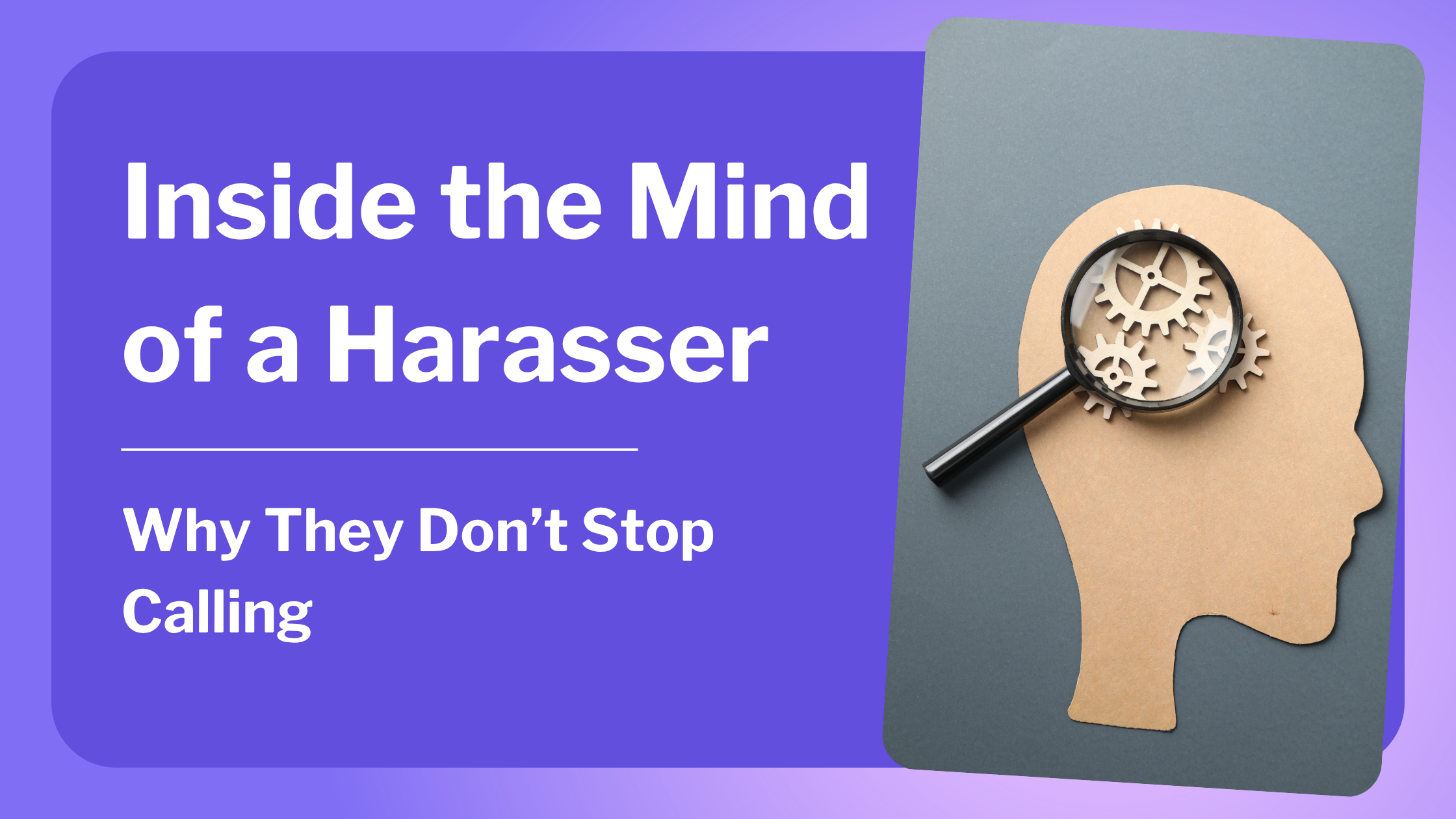
Published 11/09/25
Unwanted calls are definitely harmful, especially when they come from a hidden or blocked number. It’s frustrating and super invasive. But understanding why someone would keep reaching out after being ignored or blocked can be the first step toward reclaiming control. Whether it’s manipulation, attention-seeking, or just testing boundaries, these calls are rarely random. In this blog, we’ll take a closer look at the psychology behind harassing callers What drives them, what they hope to gain, and most importantly, how you can protect yourself with confidence.
1. What’s Going On in Their Head?
When someone calls another person on repeat, especially as a harasser, they’re often operating from a mindset that ignores your boundaries and sees you more as an object than a person. Researchers describe several common motives:
Rejection or break‑up reaction: Many harassers start their behavior after a relationship ends (or they believe it has). They can feel abandoned and they believe the repeated contact is a way to regain control or get what they want. (One Love Foundation)
Obsession or entitlement: They may believe you “owe them” something. Be it an explanation, attention, or connection, so they persist despite your “no”. Narcissistic or obsessive traits are commonly found in these cases. (Mind the Graph)
Control and intimidation: Some callers use repeated contact, ambiguity (hidden number),to unsettle you, provoke a reaction, or test your limits. (The Behaviour Institute)
By seeing the system behind their behavior, you gain power. You realize there’s a logic (twisted though it may be) behind the calls, and that helps you respond strategically.
2. Why Hidden or Blocked Numbers Are Part of the Strategy
When the number shows as “No Caller ID”, “Restricted”, or uses economy" style="text-decoration-line: underline; color:#C3BAFF">spoofing/blocks, it’s not just a coincidence. It is done to serve multiple functions:
It prevents you from screening or easily identifying the caller, boosting their ability to retain contact.
It adds to the unpredictability and anxiety: “Who is this? Why are they calling now?” That uncertainty is all part of their game.
If the caller knows you may escalate the harassment and get them in trouble, hiding their identity gives them the advantage of anonymity.
Recognizing that this is part of the harasser’s toolkit helps you stop seeing the calls as “weird random events” and instead as a pattern of intrusion you have a right to defend against.
3. What They Hope To Get—and What You Should NEVER Give
What’s the payoff for the harasser? And what should you not give them (even inadvertently)?
What they hope to get:
A reaction. Even anger or fear is feedback because it means they’re getting through. That reaction fuels them.
Attention. Whether they failed in another area of their life, a calling target gives them a foothold.
Restoration of power. In repeating the contact, they feel they’ve regained some agency or control.
Chaos. If your routines change, you’re unsettled and that can feel like victory for the harasser.
What you should not give:
A steady dialogue. Responding often encourages more calls, because they’ve “got access”.
Self‑blame or minimizing your fear. Saying “it’s probably nothing” gives them implicit permission.
Unmonitored contact. If you pick up every time, or respond impulsively, you give them a toehold.
Instead, proclaim your boundaries, record/document the behavior (where legal and appropriate), and treat each contact as part of a pattern, not as an isolated event.
4. Using Tools to Take Back Control
This is where you and your tools can reclaim the narrative. For example, the iCaughtYou app is designed to help you unmask hidden or blocked callers, record and recall calls, and blacklist persistent harassers. By leveraging technology, you shift the balance: from “Who’s this and what now?” to “I see you, I know you, I’m protected.”
Here are actionable steps you can take today:
Enable call‑blocking or screening features so unknown or blocked numbers don’t reach you by surprise.
Document each unwanted call: date/time, number (or “blocked”), what they said. This supports escalation if needed.
Use a trusted service or app to log calls in a format that can be reviewed or shared.
Blacklist persistent numbers so the same harasser cannot continuously cycle new variations.
Stay vigilant about your contact points: consider what info you share publicly, how your voicemail or answering behaviour might invite more calls.
By treating unwanted calls as actionable intrusion and not just inconvenience, you reclaim clarity and confidence.
5. When It’s Time to Escalate
While many harassing calls stop when boundaries are firm and contact is ignored, sometimes escalation may be necessary. If the behavior continues, becomes threatening, or you feel your safety is compromised, consider:
Reaching out to local law enforcement or a legal advisor
Using dedicated advocacy or victim support services
Alerting friends or family so they know the context (this helps you avoid isolation).
Reviewing your routines. If the calls are timed to disrupt your patterns, change your schedule if feasible to regain control.
Remember: you’re not over‑reacting because it’s the same person calling “just once” too many times. Persistent, unwanted calls are not harmless, they are a boundary being crossed.
Conclusion
When you’re faced with repeated calls from an unknown or blocked number, you’re not alone. And you don’t have to feel powerless. However, it is possible to move from being a target to being empowered. You can do this by understanding the mindset behind persistent callers and using tools like iCaughtYou to block and protect. You reclaim the clarity, confidence, and protection that every person deserves. Because you have the right to answer on your terms, not theirs. And that’s peace of mind worth defending.
For more resources and to explore how iCaughtYou can work for you, check us out.